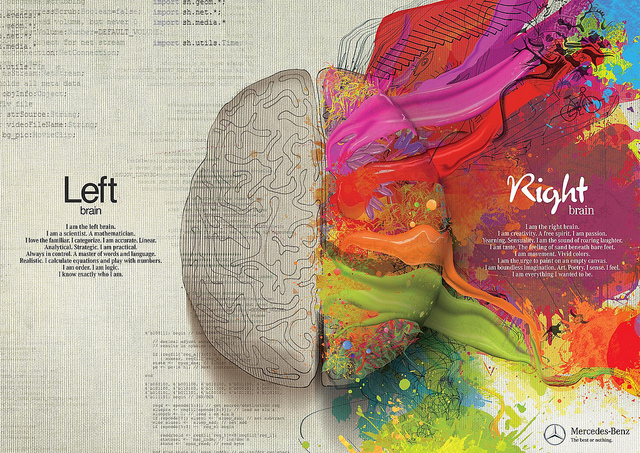LKAwesome recently discussed some of the differences between our left and right brains and how that affects what your facebook profile picture says about you. And I’ve been thinking a lot about that distinction since reading that post. I was pleasantly surprised when I ran across an article on just that subject in an issue of Philosophy Now’s magazine: Philosophy and the Two Sided Brain. Although philosophy tends to get lumped into the category of interests for people who are right-brained, this article suggests that within philosophy, there are two very different ways of seeing the field, based on which side your brain dominates:
The extreme manifestation of left-brain-dominated philosophy is maximum logical precision with minimum relevance to everyday life. The extreme manifestation of right-brain-dominated philosophy is minimum logical precision with maximum relevance to everyday life. At worst, pure left-brain-dominated philosophy tends towards over-specialization and sterile logic-chopping, while pure right-brain-dominated philosophy tends towards fuzzy and irrational speculation. This suggests that, ideally, philosophy should aim to achieve a delicate balance between the two extremes, with enough left-brain philosophy to clarify the issues under consideration, and enough right-brain philosophy to keep sight of what the important issues are.
I had to stop and read this passage twice – it was so obvious – only after reading it – and it explained so much of what I had experienced in philosophy! But it still leaves me with a puzzle. Philosophy almost always gets categorized as a “right-brain” trait, yet almost every person I know who deals with philosophy on an academic level fall much closer to the description of the left-brained description above.
So what gives?
My best guess is that when philosophy gets chalked up in the right-brain column it’s by people who haven’t experienced very much academic philosophy. For example, one of the academic papers I presented during graduate school contained the following quote, which I analyzed:
For all sentences A, B, C, D, of L,
1. it’s never the case that ¬(A˅¬A) ≥α (A˅¬A) (nontriviality); 2. B ≥α ¬(A˅¬A) (minimality);
3. A ≥α A (reflexivity);
4. if A ≥α B and B ≥α C, then A ≥α C (transitivity);
5.1 if Certα [C≡D] and A ≥α C, then A ≥α D (right equivalence);
5.2 if Certα [C≡D] and C ≥α B, then D ≥α B (left equivalence);
6.1 if for some E, Certα [¬(A·E)], Certα [¬(B·E)], and (A˅E) ≥α(B˅E), then A ≥α B (subtractivity);
6.2 if A ≥α B, then for all G such that Certα [¬(A·G)] and Certα[¬(B·G)], (A˅G) ≥α (B˅G) (additivity); 7. if |= A, then Certα[A] (tautological certainty).
– Hawthorne, James. The Lockean Thesis and the Logic of Belief. Degrees of Belief.
There’s no way you can convince me that this is type of philosophic work relies on right-brained thinking!
Although this example is particularly abstract, it symbolizes the way I view the large majority of academic philosophy. And while this work is important, it’s entirely inaccessible to someone without years of philosophic training. One of the major missions for Philosophy Matters is to make the discipline of philosophy more accessible to a general audience and to help connect the dots as to how the philosophy being done academically actually matters for our lives – because that discussion is one that is almost always left out. Yet, this is an endeavor that often gets criticized within academic philosophy circles as “dumbing down.”
Of course, the boundaries between right and left brain functionality aren’t always clear. And I’m in agreement with the Philosophy Now article that the best philosophy should strike a balance between the two. Research has shown that the best mathematicians are right-brained but have more communication with their left-brain than more average mathematicians, and this may also be the case for the best philosophers:
“The best philosophers utilize the right brain hemisphere and have advanced interhemispheric communication just like the mathematically gifted.” – Le Carrefour de la Sagesse
What I’m advocating for with Philosophy Matters is an increased awareness of the importance of “big picture” philosophizing. LKAwesome also posted a poll on her entry asking readers which side of their brain they believed was dominant. As of writing this post, the majority had answered left-brained! Which serves as a great reminder that both perspectives are important!
“If my hypothesis is correct, then philosophy can make the most useful difference in the enrichment of life if there is a balance between left-brain-dominated philosophy, which teaches focused critical thinking, and right-brain-dominated philosophy, which can view a wider context to determine which issues are most worthy of consideration. And it is only with the harmonious functioning of both hemispheres of the brain that we have the flexibility of mind to choose whether a greater emphasis on left-brain-dominated philosophy or right-brain-dominated philosophy is most needed under any given circumstance, and are able to shift gears when necessary.” – Philosophy Now


If I haven’t got it wrong, the A-E thing is a simple math or logic, as long as you will define the “symbols” (a, ><][=, and etc) of what they mean exactly, and right brained could get it just like that! So it(the A-E) thing is not just for the left brained, rather and more so for the right brained who are good at maths. By the way, I am right brained.